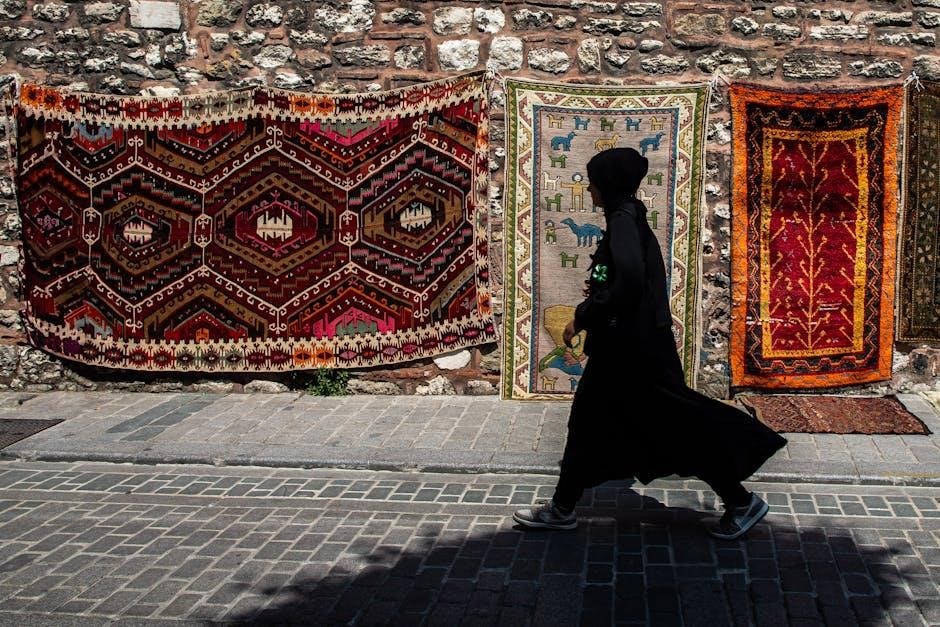1.1. Significance of Dreams in Islamic Culture
Dreams hold profound significance in Islamic culture‚ viewed as a means of divine communication. True dreams are believed to come from Allah‚ while bad ones originate from Shaitan‚ as stated by Prophet Muhammad (pbuh). This belief underscores their role in guiding believers and revealing hidden truths‚ making dream interpretation a revered practice in Islamic tradition.
Dreams are highly regarded in Islamic culture as a divine means of communication. They are believed to offer guidance‚ insight‚ and sometimes prophetic revelations. True dreams are seen as blessings from Allah‚ while others may stem from Shaitan. The Quran and Hadith emphasize their importance‚ with Prophet Muhammad (pbuh) often guided by dreams. This cultural significance underscores their role in spiritual and personal guidance‚ fostering a deeper connection with faith and righteousness.

Definition of Dreams in Islam
Dreams in Islam are categorized into two types: al-Manām and al-Ruya. Al-Manām refers to dreams during sleep‚ while al-Ruya signifies visions or insights‚ often divine in nature.
2.1. The Arabic Terms for Dreams: Al-Manām and Al-Ruya
In Islam‚ dreams are referred to by two Arabic terms: al-Manām and al-Ruya. Al-Manām denotes a dream occurring during sleep‚ while al-Ruya signifies a visionary dream or prophetic insight. Both terms highlight the spiritual significance of dreams‚ emphasizing their potential divine origin and guidance.
2.2. Classification of Dreams in Islam
Dreams in Islam are categorized into three types: righteous dreams‚ which are glad tidings from Allah; evil dreams‚ inspired by Shaitan; and neutral dreams arising from the subconscious. This classification helps believers discern their nature and interpret them appropriately‚ aligning with Islamic teachings on divine guidance and spiritual awareness.
Role of Dreams in the Quran and Hadith
Dreams are depicted in the Quran and Hadith as a means of divine communication‚ such as Prophet Muhammad’s (pbuh) dreams before key events‚ emphasizing their role in divine inspiration and guidance.
3.1. Examples of Prophetic Dreams in the Quran
The Quran highlights Prophet Yusuf’s ability to interpret dreams‚ as well as Prophet Muhammad’s (pbuh) dreams‚ such as the night before the Battle of Badr and the divine inspiration to perform pilgrimage. These examples illustrate the significance of dreams as a means of divine communication and guidance in Islamic tradition‚ emphasizing their role in prophetic revelation and decision-making.
3.2. The Role of Dreams in the Life of Prophet Muhammad (pbuh)
Dreams played a pivotal role in Prophet Muhammad’s (pbuh) life‚ serving as a foundation for his prophethood. His righteous dreams‚ such as the inspiration for pilgrimage‚ were divine revelations. Aisha narrated that his dreams were true and vivid‚ reflecting their significance in guiding his decisions and mission. These dreams were a source of wisdom and guidance for both him and the Islamic community.

Islamic Perspective on the Nature of Dreams
In Islam‚ dreams are seen as divine messages or reflections of the subconscious. They are classified as righteous (from Allah)‚ evil (from Shaitan)‚ or neutral‚ serving as guidance and insight for believers.
4.1. Sources of Dreams: Allah‚ Shaitan‚ and the Subconscious
In Islam‚ dreams are categorized based on their sources. True dreams‚ conveying glad tidings‚ originate from Allah‚ while evil or misleading ones stem from Shaitan. Neutral dreams arise from the subconscious‚ reflecting personal thoughts or experiences. This classification emphasizes the divine‚ spiritual‚ and psychological dimensions of dreams‚ guiding believers to discern their origins and meanings effectively.
4.2. The Purpose of Dreams in Islamic Belief
Dreams in Islam serve as a divine means of communication‚ offering guidance‚ insight‚ and revelation. They inspire righteousness‚ provide comfort‚ and sometimes foretell future events. True dreams are seen as a blessing‚ aiding believers in making righteous decisions and strengthening their spiritual connection to Allah‚ while also offering solace and clarity in life’s challenges.
The Process of Dream Interpretation in Islam
Dream interpretation in Islam involves seeking guidance from the Quran and Hadith‚ analyzing context‚ and avoiding baseless interpretations. It emphasizes understanding divine messages and spiritual growth.
5.1. Seeking Guidance from the Quran and Hadith
In Islam‚ dream interpretation begins with seeking guidance from the Quran and Hadith. The Quran provides examples‚ such as Prophet Joseph’s dreams‚ while Hadiths offer Prophet Muhammad’s insights. True dreams are believed to come from Allah‚ and bad ones from Shaitan. Scholars like Ibn Sirin emphasize interpreting dreams through divine texts and prophetic traditions‚ ensuring interpretations align with Islamic teachings and values.
5.2. The Importance of Context in Interpretation
Context plays a vital role in Islamic dream interpretation‚ as the same dream can signify different meanings for different individuals. Personal circumstances‚ emotions‚ and surroundings must be considered to ensure accurate interpretations. This personalized approach ensures that interpretations align with the individual’s life and faith‚ avoiding generalized conclusions that may mislead or confuse the seeker of guidance.
5.3. Avoiding Baseless Interpretations
Avoiding baseless interpretations is crucial in Islamic dream analysis. Prophet Muhammad (pbuh) advised against sharing bad dreams to prevent unnecessary fear. Interpretations must align with the Quran and Hadith‚ ensuring they are grounded in Islamic teachings. This approach safeguards against misleading conclusions and maintains the integrity of dream interpretation as a noble practice rooted in divine guidance.

Notable Scholars and Their Contributions
Ibn Sirin and other scholars have significantly influenced Islamic dream interpretation‚ offering insights through their works and methodologies‚ guiding believers in understanding divine messages accurately;
6.1. Ibn Sirin: The Father of Islamic Dream Interpretation
Ibn Sirin‚ a renowned Islamic scholar‚ is celebrated as the father of dream interpretation. Born in 653 CE‚ he authored seminal works like Ibn Sirin’s Dictionary of Dreams‚ which remains a cornerstone in Islamic tradition. His interpretations blend Quranic insights and prophetic traditions‚ offering guidance for believers to discern divine messages and navigate life’s challenges through the understanding of dreams.
6.2. Other Prominent Scholars and Their Works
Beyond Ibn Sirin‚ scholars like Imam Al-Baghawi and Muhammad al-Akili contributed significantly. Al-Baghawi’s works linked dream interpretation to Quranic teachings‚ while al-Akili emphasized blending traditional and modern methods in his book‚ The Dreamers Handbook. Their efforts have enriched Islamic dream analysis‚ providing deeper insights and practical guidance for believers seeking to understand divine messages through their dreams.
Common Dream Themes in Islamic Tradition
Dreams in Islam often revolve around themes of righteousness‚ evil‚ and neutral experiences. True dreams‚ seen as glad tidings from Allah‚ signify divine guidance‚ while evil ones‚ from Shaitan‚ warn of misguidance. Neutral dreams‚ tied to the subconscious‚ lack spiritual significance but still hold personal meaning for the dreamer.
7.1. Dreams Related to Righteousness and Glad Tidings
Dreams related to righteousness and glad tidings are considered sacred in Islam‚ often seen as divine inspiration from Allah. These dreams‚ filled with positive imagery‚ are believed to signify spiritual guidance and future blessings. They inspire believers to adhere to righteous paths‚ as seen in the Quranic story of Prophet Yusuf‚ whose dreams foretold his noble destiny and divine favor.
7.2. Dreams Related to Evil and Misguidance
Dreams related to evil and misguidance are believed to originate from Shaitan‚ aiming to instill fear‚ doubt‚ or negativity. These dreams often symbolize spiritual trials or warnings against sinful behavior. Islamic teachings advise believers to seek refuge in Allah upon experiencing such dreams and to avoid sharing them‚ as they may spread unnecessary fear or confusion among the faithful.
7.3. Neutral Dreams and Their Interpretations
Neutral dreams‚ neither divine nor evil‚ often reflect personal thoughts‚ memories‚ or subconscious experiences. They lack spiritual significance but can offer insights into one’s emotional state. Islamic teachings suggest seeking guidance from the Quran and Hadith for interpretation‚ while avoiding unnecessary focus on such dreams. Overinterpreting neutral dreams may lead to confusion‚ so moderation is advised in their analysis and discussion.
The Role of Sunnah and Hadith
The Sunnah and Hadith provide authentic guidance on dreams‚ with Prophet Muhammad (pbuh) emphasizing true dreams as divine inspiration. References in Sahih Al-Bukhari highlight dream interpretation‚ while Sunnah practices‚ like seeking refuge from bad dreams‚ offer practical wisdom for believers seeking spiritual clarity and protection.
8.1. References to Dreams in Sahih Al-Bukhari
Sahih Al-Bukhari contains numerous references to dreams‚ emphasizing their spiritual significance. Prophet Muhammad (pbuh) stated that true dreams are part of prophethood‚ while bad dreams stem from Shaitan. Narrations highlight practices like seeking refuge from evil dreams and interpreting righteous ones as divine glad tidings‚ offering believers practical guidance and spiritual insight.
8.2. Sunnah Practices Related to Dreams
The Sunnah provides clear guidance on handling dreams; Upon waking from a bad dream‚ one should seek refuge in Allah by saying “A’udhu billahi minash-shaitanir-rajim.” Prophet Muhammad (pbuh) advised narrating good dreams to righteous individuals and interpreting them through the Quran. Bad dreams should not be shared to avoid harm‚ reflecting the balance between seeking divine insight and protecting oneself from negative influences.

Cultural and Historical Significance
Dreams have historically served as a guiding force in Islamic culture‚ influencing decisions and spiritual growth. They are deeply rooted in the lives of prophets and scholars‚ shaping beliefs and practices across generations.
9.1. Historical Examples of Dream Interpretation
In Islamic history‚ dreams played a pivotal role in guiding prophets and leaders. Prophet Muhammad (pbuh) had significant dreams‚ such as the night before the Battle of Badr and his vision of pilgrimage to Makkah. The Quran also highlights Joseph’s ability to interpret dreams‚ demonstrating their divine significance. Such examples illustrate the historical importance of dreams in Islamic culture and their role in shaping decisions and beliefs.
9.2. The Impact of Dreams on Islamic Culture
Dreams have profoundly shaped Islamic culture‚ influencing spiritual practices‚ arts‚ and community life. They are seen as divine messages‚ guiding individuals and societies. The Quran and Hadith emphasize their significance‚ with scholars like Ibn Sirin contributing to their interpretation. Dreams have inspired Islamic thought‚ fostering a deep connection between the spiritual and worldly realms‚ and remain a vital part of Muslim tradition and identity.
Practical Applications of Dream Interpretation Today
Dream interpretation remains a vital practice‚ with modern resources like Ibn Sirin’s dictionary and online platforms offering guidance. It aids in personal and spiritual growth‚ providing insights into divine will and self-reflection‚ while also preserving traditional Islamic wisdom in contemporary times.
10.1. Modern Resources for Islamic Dream Interpretation
Modern resources like Ibn Sirin’s dictionary and online platforms such as myIslamicDream.com provide accessible interpretations. PDFs‚ including “The Dreamers Handbook” by Muhammad Mustafa Al-Jibali‚ offer comprehensive guides. These tools blend traditional wisdom with contemporary accessibility‚ aiding believers in understanding divine messages and personal growth through Islamic principles.
10.2. The Role of Dreams in Personal and Spiritual Growth
Dreams play a vital role in personal and spiritual growth‚ offering insights into an individual’s subconscious and divine guidance. They encourage self-reflection‚ moral accountability‚ and the pursuit of righteousness. By interpreting dreams through Islamic principles‚ believers can align their actions with Allah’s will‚ fostering inner peace and spiritual elevation. Dreams thus serve as a tool for both personal betterment and deeper faith commitment.
Psychological and Spiritual Insights
Dreams offer insights into the subconscious‚ aiding self-awareness and emotional healing. Spiritually‚ they provide divine guidance‚ fostering a deeper connection with Allah and moral awakening.
11.1; The Connection Between Dreams and Mental Health
Dreams reflect the subconscious mind‚ offering insights into emotional and psychological states. In Islam‚ true dreams bring peace and clarity‚ while false ones may cause distress. Interpreting dreams through Islamic teachings helps individuals address inner conflicts‚ fostering mental well-being and spiritual balance. This connection emphasizes the importance of seeking guidance from the Quran and Hadith for emotional and mental harmony.
11.2. Spiritual Growth Through Dream Analysis
Dream analysis in Islam serves as a tool for spiritual growth‚ offering insights into divine guidance. True dreams‚ seen as a form of revelation‚ help believers align their actions with Allah’s will‚ fostering self-reflection and moral improvement. By interpreting dreams through Islamic teachings‚ individuals can deepen their faith‚ enhance their character‚ and strengthen their connection with the divine.
Challenges and Limitations
Interpreting dreams in Islam faces challenges‚ such as distinguishing between divine and satanic influences. Misinterpretation can lead to confusion and spiritual harm‚ requiring careful analysis and guidance.
12.1. Misinterpretation of Dreams in Modern Times
Modern times bring challenges in dream interpretation‚ with misinterpretations often stemming from cultural influences or lack of proper guidance. Shaitan’s role in inducing misleading dreams complicates the process‚ leading to confusion. Muslims must seek knowledgeable scholars to avoid incorrect conclusions‚ ensuring interpretations align with Islamic teachings and avoid harmful misunderstandings.
12;2. The Influence of Shaitan on Dream Interpretation
Shaitan significantly influences dream interpretation by inducing bad or false dreams‚ leading to misguidance and evil actions. These dreams often cause fear‚ doubt‚ and confusion among believers; Muslims are advised to seek refuge with Allah and adhere to Islamic teachings to protect against such influences. It’s crucial to avoid sharing bad dreams to prevent spreading negativity and maintain spiritual clarity.

Comparison with Other Cultural Interpretations
Dream interpretation in Islam shares similarities with other cultures‚ such as believing in divine communication‚ but uniquely emphasizes Quranic guidance and classifies dreams into righteous‚ evil‚ and neutral‚ differing from psychological or symbolic approaches in other traditions.
13.1. Similarities with Other Religious Traditions
Dream interpretation shares common ground across religions‚ with many viewing dreams as divine messages or spiritual guidance. Like Islam‚ other traditions‚ such as Judaism and Christianity‚ often see dreams as omens or revelations. The belief in divine communication through dreams is universal‚ emphasizing their role in providing insight‚ reassurance‚ or warnings‚ reflecting a shared human quest for meaning and connection to the divine.
13.2. Unique Aspects of Islamic Dream Interpretation
Islamic dream interpretation is distinct in its classification of dreams into three types: divine inspiration‚ psychological reflections‚ and satanic illusions. The use of Quranic verses and Hadiths for interpretation‚ along with the contributions of scholars like Ibn Sirin‚ sets it apart. The emphasis on seeking divine guidance and avoiding baseless interpretations further highlights its unique framework rooted in Islamic teachings and traditions.

The Future of Dream Interpretation in Islam
The integration of technology with traditional Islamic dream interpretation methods is expected to enhance accessibility and understanding‚ while preserving the sacred teachings of scholars like Ibn Sirin.
14.1. The Role of Technology in Dream Analysis
Technology is transforming Islamic dream interpretation through digital platforms and AI-driven tools‚ enabling instant access to resources like Ibn Sirin’s works. Apps and websites now offer dream analysis‚ blending traditional insights with modern accessibility‚ while ensuring adherence to Islamic principles and preserving the timeless wisdom of scholars in a rapidly evolving world.
14.2. Preserving Traditional Methods in a Modern World
Despite technological advancements‚ Islamic dream interpretation remains rooted in traditional methods‚ emphasizing the study of Quran and Hadith. Scholars continue to rely on timeless works of Ibn Sirin and others‚ ensuring authenticity. The balance between modern tools and ancient wisdom preserves the integrity of Islamic teachings‚ guiding believers to seek divine insights while navigating contemporary life.
Dreams in Islam remain a vital source of divine wisdom‚ guiding believers through life. Their enduring significance underscores the profound connection between the subconscious and spiritual growth.
15;1. The Enduring Significance of Dreams in Islam
Dreams in Islam are a divine gift‚ offering guidance and insight into the subconscious. Their enduring significance lies in their ability to connect believers with Allah’s wisdom‚ providing solace‚ warnings‚ and inspiration. Rooted in the Quran and Hadith‚ dreams remain a vital part of Islamic spirituality‚ fostering personal and communal growth while emphasizing the divine will in human experiences.
15.2. Final Thoughts on the Islamic Interpretation of Dreams
The Islamic interpretation of dreams is a profound reflection of divine communication‚ offering guidance and insight. While true dreams from Allah provide wisdom‚ caution is needed to avoid baseless interpretations. This balance‚ rooted in the Quran and Hadith‚ underscores the enduring relevance of dream interpretation in Islamic spirituality‚ guided by scholars and traditional methods.

No Responses